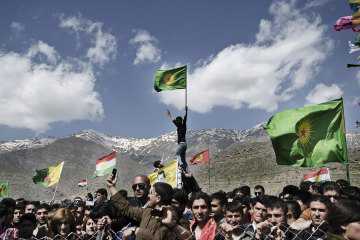By Karl VickMarch 28
 HAWRE MUHAMED / METROGRAPHY
HAWRE MUHAMED / METROGRAPHY
Kurds celebrate Newroz in the PKK controlled area of Qandil in the north of Iraqi Kurdistan.
A sandstorm was kicking up at Ben Gurion International midday last Friday, winds bad enough to cancel the departure ceremony for President Obama’s winning trip to Israel. But in a sheet metal trailer on the tarmac, Obama was calming another storm, three years along and finally running out of bluster. In the box with him was his host, Israeli prime minister Benjamin Nentayahu. In Netanyahu’s hand was a cell phone. And on the other end of the line was the prime minister of Turkey, Recep Tayyip Erdogan.
As arranged in advance by Obama and diplomats from all three countries, Bibi read out an official apology for the nine lives lost on the Turkish vessel Mavi Marmara in May 2010, when Israeli commandos boarded the aid ship en route to breaking Israel’s blockade on the Gaza Strip. Netanyahu’s words, along with a promise to compensate survivors and continue to ease strictures on the Palestinian enclave, ended a diplomatic cleavage seated in sheer cussedness, and restored what one Israeli diplomat calls “the triangle” – made up of the two most stable and prosperous democracies in the Middle East, and the superpower that needs them on the same side.
If that was all that went Erdogan’s way last week, he might have come in second to Obama, whose tour of Israel left the supposedly wary Jewish population something close to twitterpated. But Erdogan had already pulled off a diplomatic coup of his own — and just one day earlier: Abdullah Ocalan, the imprisoned head of the insurgent Kurdistan Workers’ Party, known by its intials in Turkish as the PKK, had agreed to end the country’s bloody 29-year civil war and bring the Kurdish struggle into the realm of representative politics. In the space of two days, Erdogan – once jailed himself for an Islamist proclamation – had brought to life the foreign policy slogan of Turkey’s modern founder, the rigorously secular Kemal Ataturk: “Peace at home, peace abroad.”
(MORE: New Day for the Kurds: Will Ocalan’s Declaration Bring Peace With Turkey?)
The story of “Turkey’s Triumphs” appears in this week’s print edition of TIME, available to subscribers here. It lays out the implications for the American strategy in the Middle East of the tentative rapprochement between Jerusalem and Ankara — closely allied before Erdogan’s rise to power. Burying the hatchet should pay off first for Washington in Syria, the country coming apart between Israel and Turkey. Both have huge stakes in the outcome of that Arab nation’s civil war, but while Turkey has been deeply involved in sheltering and arming the rebels, Israel has taken pains to stand back, keenly aware that even the perception of support for the uprising will be unhelpful, given its standing in the region. The exception is Syria’s arsenal of advanced weapons, including chemical and biological arms; the Jewish state has already interceded once , and says it will again if they detect them falling into the hands of Hizballah or other terror groups.
But history may well show that, if it holds, the pact with the Kurds will be of greater significance. Turkey is home to perhaps half of the world’s at least 30 million Kurds, the largest population still seeking a homeland of their own, after being promised one, then denied it, as European leaders were drawing the map of the Middle East after World War I. The uprising Ocalan began in 1984 claimed 40,000 lives; it sought secession for most of the war sought. Kurds now say they will be happy with equal rights and some form of cooperation with fellow Kurds across the borders in northern Iraq, western Iran and in Syria – where a Kurdish party allied with the PKK has won a measure of autonomy by keeping out of the civil war. Its accommodation with the PKK may well give Ankara a new measure of influence in what happens with Syria’s Kurds. It already enjoys close ties with Northern Iraq’s Kurdish government, to the point of cooperating on building a pipeline from the oilfields of Kirkuk, bypassing Baghdad. Iraq’s Kurds, in turn, have a history of cooperation with Israel. So in a way, what Obama did in the trailer in the sandstorm on the runway was to close a circle. It’s far from a perfect circle, though, especially given Erdogan’s ardent support for the Palestinians, including Hamas. The day after receiving the apology, he announced he was considering a trip to the Gaza Strip. Washington said it wished he wouldn’t.
But the Turks figure they’re on a roll, as Erodgan’s top advisor, Ibrahim Kalin, told TIME’s Pelin Turgut: ”The apology in particular presents new opportunities for the moribund Middle East peace process, which the Obama administration has tried to revive without much success. We are aware of the obstacles to the realization of the two-state solution, including the occupation of Palestinian territories and the illegal settlements,” Kalin said. ”But it is not impossible to establish peace and security for both Israelis and Palestinians, each having its own state and enjoying a free and dignified life.”
via Turkey’s Big Week Means New Clout In An Emerging Middle East | TIME.com.